Neat People vs. Sloppy People
Unit1-Neat-People-vs.-Sloppy-People-原文与翻译
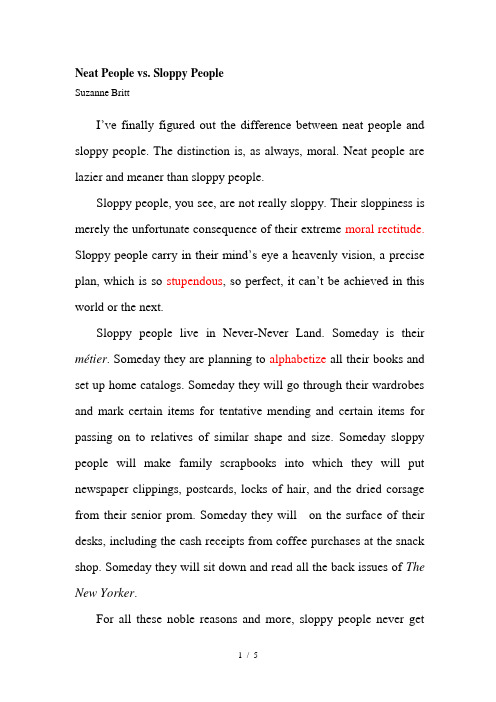
Neat People vs. Sloppy PeopleSuzanne BrittI’ve finally figured out the difference between neat people and sloppy people. The distinction is, as always, moral. Neat people are lazier and meaner than sloppy people.Sloppy people, you see, are not really sloppy. Their sloppiness is merely the unfortunate consequence of their extreme moral rectitude. Sloppy people carry in their mind’s eye a h eavenly vision, a precise plan, which is so stupendous, so perfect, it can’t be achieved in this world or the next.Sloppy people live in Never-Never Land. Someday is their métier. Someday they are planning to alphabetize all their books and set up home catalogs. Someday they will go through their wardrobes and mark certain items for tentative mending and certain items for passing on to relatives of similar shape and size. Someday sloppy people will make family scrapbooks into which they will put newspaper clippings, postcards, locks of hair, and the dried corsage from their senior prom. Someday they will on the surface of their desks, including the cash receipts from coffee purchases at the snack shop. Someday they will sit down and read all the back issues of The New Yorker.For all these noble reasons and more, sloppy people never getneat. They aim too high and wide. They save everything, planning someday to and straighten out the world. But while these ambitious plans take clearer and clearer shape in their heads, the books spill from the shelves onto the floor, the clothes pile up in the hamper and closet, the family mementos accumulate in every drawer, the surface of the desk is buried under mounds of paper and the unread magazines threaten to reach the ceiling.Sloppy people can’t bear to part with anything. They give loving attention to every detail. When slop py people say they’re going to tackle the surface of a desk, they really mean it. Not a paper will go unturned; not a rubber band橡皮筋will go unboxed. Four hours or two weeks into the excavation, the desk looks exactly the same, primarily because the sloppy person is meticulously creating new piles of papers with new headings and scrupulously stopping to read all the old book catalogs before he throws them away. A neat person would just bulldoze the desk.Neat people are bums and clods at heart. They have cavalier attitudes toward possessions, including family heirlooms. Everything is just another dust-catcher to them. If anything collects dust, it’s got to go and that’s that. Neat people will toy with the idea of throwing the children out of the house just to cut down the clutter.Neat people don’t care about process. They like results. Whatthey want to do is get the whole thing over with so they can sit down and watch the rasslin’ on TV. Neat people operate on two unvarying principles: Never handle any item twice, and throw everything away.The only thing messy in a neat person’s house is the trash can. The minute something comes to a neat person’s hand, he will look at it, try to decide if it has immediate use and, finding none, throw it in the trash.Neat people are especially vicious with mail. They never go through their mail unless they are standing directly over a trash can. If the trash can is beside the mailbox, even better. All ads, catalogs, pleas for charitable contributions, church bulletins and money-saving coupons go straight into the trash can without being opened. All letters from home, postcards from Europe, bills and paychecks are opened, immediately responded to, then dropped in the trash can. Neat people keep their receipts only for tax purposes. That’s it. No sentimental salvaging of birthday cards or the last letter of a dying relative ever wrote. Into the trash it goes.Neat people place neatness above everything, even economics. They are incredibly wasteful. Neat people throw away several toys every time they walk through the den. I knew a neat person once who threw away a perfectly good dish drainer because it had mold on it. The drainer was too much trouble to wash. And neat people sell theirfurniture when they move. They will sell a La-Z-Boy recliner while you are reclining in it.Neat people are no good to borrow from. Neat people buy everything in expensive little single portions. They get their flour and sugar in two-pound bags. They wouldn’t consider clipping a coupon, saving leftover, reusing plastic non-dairy不含牛奶的;没有乳制品whipped cream n. 生奶油containers or rinsing off tin foil and draping it over the unmold dish drainer. You can never borrow a neat person’s newspaper to see what’s playing at the movies. Neat people have the paper all wadded up and in the trash by 7:05 a.m.Neat people cut a clean swath through the organic as well as the inorganic world. People, animals, and things are all one to them. They are so insensitive. After they’ve finished with the pantry, the medicine cabinet, and the attic, they will throw out the red geranium 英 [dʒɪ'reɪnɪəm] n. 天竺葵(too many leaves), sell the dog (too many fleas), and send the children off to boarding school (too many scuffmarks on the hardwood floors).整洁人与邋遢人苏珊娜·布里特我终于悟出了整洁人和邋遢人的区别。
Unit 2 Text I Neat people 原文与翻译
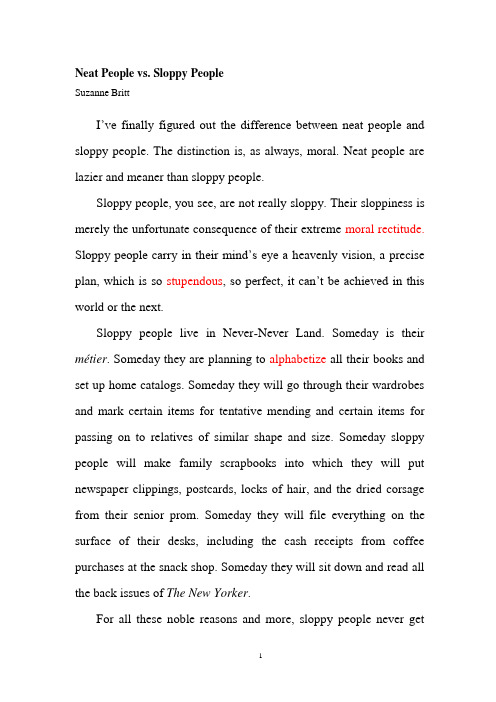
Neat People vs. Sloppy PeopleSuzanne BrittI’ve finally figured out the difference between neat people and sloppy people. The distinction is, as always, moral. Neat people are lazier and meaner than sloppy people.Sloppy people, you see, are not really sloppy. Their sloppiness is merely the unfortunate consequence of their extreme moral rectitude. Sloppy people carry in their mind’s eye a h eavenly vision, a precise plan, which is so stupendous, so perfect, it can’t be achieved in this world or the next.Sloppy people live in Never-Never Land. Someday is their métier. Someday they are planning to alphabetize all their books and set up home catalogs. Someday they will go through their wardrobes and mark certain items for tentative mending and certain items for passing on to relatives of similar shape and size. Someday sloppy people will make family scrapbooks into which they will put newspaper clippings, postcards, locks of hair, and the dried corsage from their senior prom. Someday they will file everything on the surface of their desks, including the cash receipts from coffee purchases at the snack shop. Someday they will sit down and read all the back issues of The New Yorker.For all these noble reasons and more, sloppy people never getneat. They aim too high and wide. They save everything, planning someday to file order and straighten out the world. But while these ambitious plans take clearer and clearer shape in their heads, the books spill from the shelves onto the floor, the clothes pile up in the hamper and closet, the family mementos accumulate in every drawer, the surface of the desk is buried under mounds of paper and the unread magazines threaten to reach the ceiling.Sloppy people can’t bear to part with anything. They give loving attention to every detail. When sloppy people say they’re going to tackle the surface of a desk, they really mean it. Not a paper will go unturned; not a rubber band橡皮筋will go unboxed. Four hours or two weeks into the excavation, the desk looks exactly the same, primarily because the sloppy person is meticulously creating new piles of papers with new headings and scrupulously stopping to read all the old book catalogs before he throws them away. A neat person would just bulldoze the desk.Neat people are bums and clods at heart. They have cavalier attitudes toward possessions, including family heirlooms. Everything is just another dust-catcher to them. If anything co llects dust, it’s got to go and that’s that. Neat people will toy with the idea of throwing the children out of the house just to cut down the clutter.Neat people don’t care about process. They like results. Whatthey want to do is get the whole thing over with so they can sit down and watch the rasslin’ on TV. Neat people operate on two unvarying principles: Never handle any item twice, and throw everything away.The only thing messy in a neat person’s house is the trash can. The minute something comes to a neat person’s hand, he will look at it, try to decide if it has immediate use and, finding none, throw it in the trash.Neat people are especially vicious with mail. They never go through their mail unless they are standing directly over a trash can. If the trash can is beside the mailbox, even better. All ads, catalogs, pleas for charitable contributions, church bulletins and money-saving coupons go straight into the trash can without being opened. All letters from home, postcards from Europe, bills and paychecks are opened, immediately responded to, then dropped in the trash can. Neat people keep their receipts only for tax purposes. That’s it. No sentimental salvaging of birthday cards or the last letter of a dying relative ever wrote. Into the trash it goes.Neat people place neatness above everything, even economics. They are incredibly wasteful. Neat people throw away several toys every time they walk through the den. I knew a neat person once who threw away a perfectly good dish drainer because it had mold on it. The drainer was too much trouble to wash. And neat people sell theirfurniture when they move. They will sell a La-Z-Boy recliner while you are reclining in it.Neat people are no good to borrow from. Neat people buy everything in expensive little single portions. They get their flour and sugar in two-pound bags. They wouldn’t consider clipping a coupon, saving leftover, reusing plastic non-dairy不含牛奶的;没有乳制品whipped cream n. 生奶油containers or rinsing off tin foil and draping it over the unmold dish drainer. You can never borrow a neat person’s newspaper to see what’s playing at the movies. Neat people have the paper all wadded up and in the trash by 7:05 a.m.Neat people cut a clean swath through the organic as well as the inorganic world. People, animals, and things are all one to them. They are so insensitive. After they’ve finished with the pantry, the medicine cabinet, and the attic, they will throw out the red geranium 英 [dʒɪ'reɪnɪəm] n. 天竺葵(too many leaves), sell the dog (too many fleas), and send the children off to boarding school (too many scuffmarks on the hardwood floors).整洁人与邋遢人苏珊娜·布里特我终于悟出了整洁人和邋遢人的区别。
整洁的人和邋遢的人

整洁的人和邋遢的人I’ve finally figured out the difference between neat people and sloppy people. The distinction is, as always, moral. Neat people are lazier and meaner than sloppy people.我终于明白了整洁的人和邋遢的人的不同了,他们的区别一如既往地在道德方面。
整洁的人要比邋遢的人更加懒惰,更吝啬。
Sloppy people, you see, are not really sloppy. Their sloppiness is merely the unfortunate consequence of their extreme moral rectitude (公正,诚实,清廉). Sloppy people carry in their mind’s eye a heavenly(天上的,神圣的) vision, a precise plan that is so stupendous (惊人的,巨大的), so perfect, it can’t be achieved in this world or the next.你看到的邋遢的人其实并不是真正的邋遢,这只不过是他们极端的道德公正态度带来的不幸后果。
邋遢的人时刻记住有着美好的幻想,一个精确的计划,如此的惊人,如此的完美,以至于这个幻想不能被在此生甚至下辈子所完成。
Sloppy people live in Never-Never Land. Someday is their metier(职业专长). Someday they are planning to alphabetize all their books and set up home catalogs. Someday they will go through their wardrobes (衣柜) and mark certain items for tentative mending and certain items for passing on to (传递到) relatives of similar shape and size. Someday sloppy people will make family scrapbooks (剪贴簿) into which they will put newspaper clippings, postcards, locks of hair, and the dried corsage (胸衣) from their senior prom. Someday they will file everything on the surface of their desks, including the cash receipts from coffee purchases at the snack shop. Someday they will sit down and read all the back issues of The New Yorker.邋遢人住在偏远的地区。
综合英语教程-第7册答案-unit-1-Neat-People-Vs-sloppy-people.
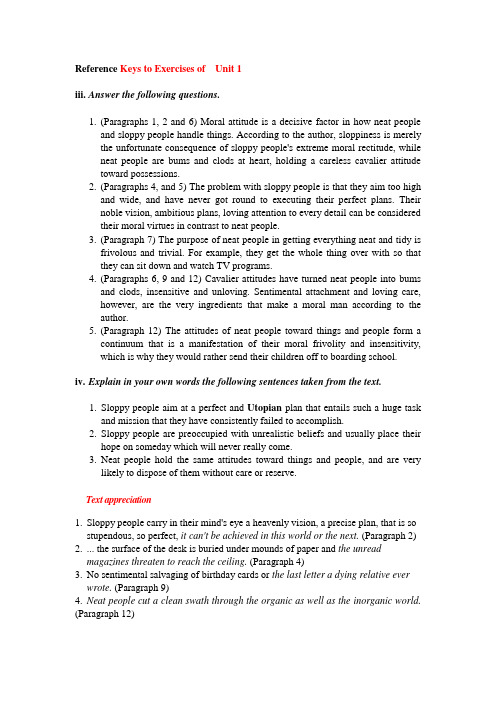
Reference Keys to Exercises of Unit 1iii.Answer the following questions.1.(Paragraphs 1, 2 and 6) Moral attitude is a decisive factor in how neat peopleand sloppy people handle things. According to the author, sloppiness is merely the unfortunate consequence of sloppy people's extreme moral rectitude, while neat people are bums and clods at heart, holding a careless cavalier attitude toward possessions.2.(Paragraphs 4, and 5) The problem with sloppy people is that they aim too highand wide, and have never got round to executing their perfect plans. Their noble vision, ambitious plans, loving attention to every detail can be considered their moral virtues in contrast to neat people.3.(Paragraph 7) The purpose of neat people in getting everything neat and tidy isfrivolous and trivial. For example, they get the whole thing over with so that they can sit down and watch TV programs.4.(Paragraphs 6, 9 and 12) Cavalier attitudes have turned neat people into bumsand clods, insensitive and unloving. Sentimental attachment and loving care, however, are the very ingredients that make a moral man according to the author.5.(Paragraph 12) The attitudes of neat people toward things and people form acontinuum that is a manifestation of their moral frivolity and insensitivity, which is why they would rather send their children off to boarding school.iv.Explain in your own words the following sentences taken from the text.1.Sloppy people aim at a perfect and Utopian plan that entails such a huge taskand mission that they have consistently failed to accomplish.2.Sloppy people are preoccupied with unrealistic beliefs and usually place theirhope on someday which will never really come.3.Neat people hold the same attitudes toward things and people, and are verylikely to dispose of them without care or reserve.Text appreciation1.Sloppy people carry in their mind's eye a heavenly vision, a precise plan, that is sostupendous, so perfect, it can't be achieved in this world or the next. (Paragraph 2) 2.... the surface of the desk is buried under mounds of paper and the unreadmagazines threaten to reach the ceiling. (Paragraph 4)3.No sentimental salvaging of birthday cards or the last letter a dying relative everwrote. (Paragraph 9)4.Neat people cut a clean swath through the organic as well as the inorganic world. (Paragraph 12)Language worki.Explain the italicized part in each sentence in your own words.1.absolute moral righteousness and correctness2.arrange in alphabetic order5. are gradually formed and developedzy and stupid5.finish quickly what they have to do6.destroy ruthlessly the main part ofI II.Fill in the blanks with the appropriate phrasal verbs or collocations from the text.1. passed on to2. toying with3. getting over4. straightened out5. part with6. figured out7. responded ... to8. gone through V.Fill in each blank in the passage below with ONE appropriate word.1. purposefully2. rather3. worthy4. who5. contributors6. developed7. staff8. stories9. described10. audience / readershipTranslationThe author holds that the fundamental difference between neat people and sloppy people is moral. The former place neatness above everything else and work on two unvarying principles: Never handle any item twice; and throw everything away. They are clear-minded and objective, but they are so indifferent that people, animals and things are all one to them. In sharp contrast, the latter fill their minds with all kinds of romantic whims and their ideals are just too perfect to come true in reality. What's more, the latter have a loving heart and seem to show sentimental attachments to everything. In a way, we may conclude that most statesmen and generals fall into the former category while most poets and artists belong to the latter type.Tips for Discussion1.With language, you might make the world laugh or weep when you laugh orweep.2.What Daniel Defoe, writer of Robinson Crusoe, experienced best illustrates thepower of the English language. It is said that his The True-born Englishman (1701) won him friendship; with the king while The Shortest Way with the Dissenters(1702) brought him into jail.3.So far as varieties of language are concerned, degrees of formality reflect to aconsiderate extent degrees of familiarity between people.4.Private language, though casual and less refined, often displays intimacy whilepublic language often betrays the distance between people.Composition Writing1.Based on your observations of friends or roommates and your own experiences,compare and contrast in a paragraph two people’s attitudes toward something.Focus on a single significant point of comparison. You might consider thefollowing as possible subjects:e of telephoneB.ClothesC.Shared vs. private spaceD.Shared vs. private objectsE.Loudness of conversations or musicF.Public behavior at a bus stop or some other places.。
Neat people and sloppy people

Neat people and sloppy peopleNeat people and sloppy people are distinctive in some aspects. It’s obviously that neat people are more popular than sloppy people. Neat people are more dapper and clean. On the country, sloppy people are filthy and slovenly.Neat people will make a lot of friends in their life. Sloppy people will feel lonely because they have no friends. People always make friends with those gentleman and gentlewomen because they are dapper, tidy, and elegant. They make people feel comfortable and happiness. People do not want to make friends with those sloppy people. They make people feel uncomfortable. People don’t see any better from them.The life of neat people are wonderful than sloppy people. Neat people will make a lot of money, but sloppy people will not. Neat people will get a lot of chance in their job and their boss like them absolutely. They totally do those things better. Sloppy people get a little chance and ear few money, their life is ordinary.The things you deserved due to who are you. If you are a good man, you will meet he well thing. If you are terrible, you will meet the bad thing. In a word, be a neat people, you will become lucky.。
Unit 1 Sloppy People Vs Neat People

• sloppy a. (careless; untidy) eg. a sloppy typing/repair, sloppy sentiment/film (指人)衣冠不整,草率粗心的, (cf. sloppy and slovenly )
Detailed Analysis Part 2
Subdivide this part into smaller parts Sloppy people have a high moral standard, give a loving attention to every detail. • Part 3(P6-12) • Neat people are portrayed as coldblooded, ruthless and very practical.
Contact me
252914072@ B14
Grading S & Requirements
Grading S: • Attendance: 10% • Class Performance: 10% • Homework: 10%(D& Exercise book) • Final:70%
An effective beginning. Making a comparison between a neat person and a sloppy person in a blunt and unexpected way, which succeeds in arousing the interest of the reader. Overthrow traditional opinions of them.
• Part 1 (P1) How many layers of meaБайду номын сангаасing are their in Para 1? What makes the author think that the difference between neat people and sloppy people is moral?
Unit 1 Sloppy People Vs Neat People

Assignment
• Language Work (for each Unit in Book 7-8) • Speech Based on the Comprehension about the text (5~10 points)
• Writing Practice (3*5=15 points)
Teaching Vehicles
• Text-book: An Integrated English Course Students Book 7, 何兆 熊,上海外语教育出版社,2007 An Integrated English Course Students Book 8, 何兆 熊,上海外语教育出版社,2007 • Exercise-books: 英语专业七级水平测试习题集, 文秋芳,上海外语教育出版 社,2006 TEM-8 人文知识与改错,李战子,王萍,上海外语教育出 版社,2010
Learning Focus
• Syntactic level: Grammatical feature and the meaning for some complicate sentences; • Semantic level: Accuracy and appropriateness of English language use in the whole passage; • Content level: the author’s penetrating insights into human psychology reflected from dynamic cultural phenomenon of the society. (the attitude we should have.)
unit1neatpeoplevs.sloppypeople原文与翻译
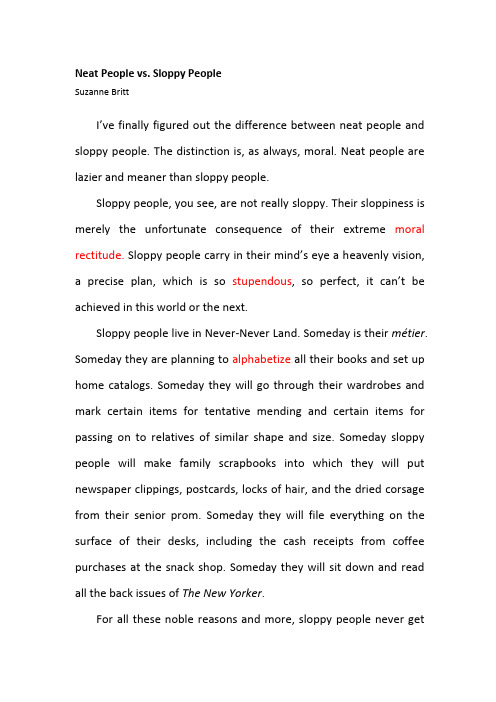
Neat People vs. Sloppy PeopleSuzanne BrittI’ve finally figured out the difference between neat people and sloppy people. The distinction is, as always, moral. Neat people are lazier and meaner than sloppy people.Sloppy people, you see, are not really sloppy. Their sloppiness is merely the unfortunate consequence of their extreme moral rectitude.Sloppy people carry in their mind’s eye a h eavenly vision, a precise plan, which is so stupendous, so perfect, it can’t be achieved in this world or the next.Sloppy people live in Never-Never Land. Someday is their métier. Someday they are planning to alphabetize all their books and set up home catalogs. Someday they will go through their wardrobes and mark certain items for tentative mending and certain items for passing on to relatives of similar shape and size. Someday sloppy people will make family scrapbooks into which they will put newspaper clippings, postcards, locks of hair, and the dried corsage from their senior prom. Someday they will file everything on the surface of their desks, including the cash receipts from coffee purchases at the snack shop. Someday they will sit down and read all the back issues of The New Yorker.For all these noble reasons and more, sloppy people never getneat. They aim too high and wide. They save everything, planning someday to file order and straighten out the world. But while these ambitious plans take clearer and clearer shape in their heads, the books spill from the shelves onto the floor, the clothes pile up in the hamper and closet, the family mementos accumulate in every drawer, the surface of the desk is buried under mounds of paper and the unread magazines threaten to reach the ceiling.Sloppy people can’t bear to part with anything. They give loving attention to every detail. When sloppy people say they’re going to tackle the surface of a desk, they really mean it. Not a paper will go unturned; not a rubber band橡皮筋will go unboxed. Four hours or two weeks into the excavation, the desk looks exactly the same, primarily because the sloppy person is meticulously creating new piles of papers with new headings and scrupulously stopping to read all the old book catalogs before he throws them away. A neat person would just bulldoze the desk.Neat people are bums and clods at heart. They have cavalier attitudes toward possessions, including family heirlooms. Everything is just another dust-catcher to them. If anything collects dust, it’s got to go and that’s that. Neat people will toy with the idea of throwing the children out of the house just to cut down the clutter.Neat people don’t care about process. They like results. Whatthey want to do is get the whole thing over with so they can sit down and watch the rasslin’ on TV. Neat people operate on two unvarying principles: Never handle any item twice, and throw everything away.The only thing messy in a neat person’s house is the trash can. The minute something comes to a neat person’s hand, he will look at it, try to decide if it has immediate use and, finding none, throw it in the trash.Neat people are especially vicious with mail. They never go through their mail unless they are standing directly over a trash can. If the trash can is beside the mailbox, even better. All ads, catalogs, pleas for charitable contributions, church bulletins and money-saving coupons go straight into the trash can without being opened. All letters from home, postcards from Europe, bills and paychecks are opened, immediately responded to, then dropped in the trash can. Neat people keep their receipts only for tax purposes. That’s it. No sentimental salvaging of birthday cards or the last letter of a dying relative ever wrote. Into the trash it goes.Neat people place neatness above everything, even economics. They are incredibly wasteful. Neat people throw away several toys every time they walk through the den. I knew a neat person once who threw away a perfectly good dish drainer because it had moldon it. The drainer was too much trouble to wash. And neat people sell their furniture when they move. They will sell a La-Z-Boy recliner while you are reclining in it.Neat people are no good to borrow from. Neat people buy everything in expensive little single portions. They get their flour and sugar in two-pound bags. They wouldn’t consider clipping a coupon, saving leftover, reusing plastic non-dairy不含牛奶的;没有乳制品whipped cream n. 生奶油containers or rinsing off tin foil and draping it over the unmold dish drainer. You can never borrow a neat person’s newspaper to see what’s playing at the movies. Neat people have the paper all wadded up and in the trash by 7:05 a.m.Neat people cut a clean swath through the organic as well as the inorganic world. People, animals, and things are all one to them. They are so insensitive. After they’ve finished with the pantry, the medicine cabinet, and the attic, they will throw out the red geranium英 [dʒɪ'reɪnɪəm] n. 天竺葵(too many leaves), sell the dog (too many fleas), and send the children off to boarding school (too many scuffmarks on the hardwood floors).整洁人与邋遢人苏珊娜·布里特我终于悟出了整洁人和邋遢人的区别。
Unit2TextINeatpeople原文与翻译

Neat People vs. Sloppy PeopleSuzanne BrittI’ve finally figured out the difference between neat people and sloppy people. The distinction is, as always, moral. Neat people are lazier and meaner than sloppy people.Sloppy people, you see, are not really sloppy. Their sloppiness is merely the unfortunate consequence of their extreme moral rectitude. Sloppy people carry in their mind’s eye a h eavenly vision, a precise plan, which is so stupendous, so perfect, it can’t be achieved in this world or the next.Sloppy people live in Never-Never Land. Someday is their métier. Someday they are planning to alphabetize all their books and set up home catalogs. Someday they will go through their wardrobes and mark certain items for tentative mending and certain items for passing on to relatives of similar shape and size. Someday sloppy people will make family scrapbooks into which they will put newspaper clippings, postcards, locks of hair, and the dried corsage from their senior prom. Someday they will file everything on the surface of their desks, including the cash receipts from coffee purchases at the snack shop. Someday they will sit down and read all the back issues of The New Yorker.For all these noble reasons and more, sloppy people never get neat. They aim too high and wide. They save everything, planningsomeday to file order and straighten out the world. But while these ambitious plans take clearer and clearer shape in their heads, the books spill from the shelves onto the floor, the clothes pile up in the hamper and closet, the family mementos accumulate in every drawer, the surface of the desk is buried under mounds of paper and the unread magazines threaten to reach the ceiling.Sloppy people can’t bear to part with anything. They give loving attention to every detail. When sloppy people say they’re going to tackle the surface of a desk, they really mean it. Not a paper will go unturned; not a rubber band橡皮筋will go unboxed. Four hours or two weeks into the excavation, the desk looks exactly the same, primarily because the sloppy person is meticulously creating new piles of papers with new headings and scrupulously stopping to read all the old book catalogs before he throws them away. A neat person would just bulldoze the desk.Neat people are bums and clods at heart. They have cavalier attitudes toward possessions, including family heirlooms. Everything is just another dust-catcher to them. If anything collects dust, it’s got to go and that’s that. Neat people will toy with the idea of throwing the children out of the house just to cut down the clutter.Neat people don’t care about process. They like results. What they want to do is get the whole thing over with so they can sit downand watch the rasslin’ on TV. Neat people operate on two unvarying principles: Never handle any item twice, and throw everything away.The only thing messy in a neat person’s house is the trash can. The minute something comes to a neat person’s hand, he will look at it, try to decide if it has immediate use and, finding none, throw it in the trash.Neat people are especially vicious with mail. They never go through their mail unless they are standing directly over a trash can. If the trash can is beside the mailbox, even better. All ads, catalogs, pleas for charitable contributions, church bulletins and money-saving coupons go straight into the trash can without being opened. All letters from home, postcards from Europe, bills and paychecks are opened, immediately responded to, then dropped in the trash can. Neat people keep the ir receipts only for tax purposes. That’s it. No sentimental salvaging of birthday cards or the last letter of a dying relative ever wrote. Into the trash it goes.Neat people place neatness above everything, even economics. They are incredibly wasteful. Neat people throw away several toys every time they walk through the den. I knew a neat person once who threw away a perfectly good dish drainer because it had mold on it. The drainer was too much trouble to wash. And neat people sell their furniture when they move. They will sell a La-Z-Boy recliner whileyou are reclining in it.Neat people are no good to borrow from. Neat people buy everything in expensive little single portions. They get their flour and sugar in two-pound bags. They wouldn’t consider c lipping a coupon, saving leftover, reusing plastic non-dairy不含牛奶的;没有乳制品whipped cream n. 生奶油containers or rinsing off tin foil and draping it over the unmold dish drainer. You can never borrow a neat person’s newspaper to see what’s playing at the movies. Neat people have the paper all wadded up and in the trash by 7:05 a.m.Neat people cut a clean swath through the organic as well as the inorganic world. People, animals, and things are all one to them. They are so insensitive. After they’ve finished with the pantry, the medicine cabinet, and the attic, they will throw out the red geranium 英 [dʒɪ'reɪnɪəm] n. 天竺葵(too many leaves), sell the dog (too many fleas), and send the children off to boarding school (too many scuffmarks on the hardwood floors).整洁人与邋遢人苏珊娜·布里特我终于悟出了整洁人和邋遢人的区别。
Unit 1 Sloppy People Vs Neat People

•
• 2. What possible reasons lie behind the differences between neat people and sloppy people?
Glossary
• sloppy a. (careless; untidy) eg. a sloppy typing/repair, sloppy sentiment/film (指人)衣冠不整,草率粗心的, (庸俗伤感的) • rectitude n. (honesty and moral uprightness)品行端正 • corsage n. (a small bouquet of flowers fixed on the upper part of women’s clothes.) 女服上身佩戴的小花束
Luo Ying
Teaching Goals
• The purpose in teaching course for the senior students is mainly twofold: • 1.Improve students’ language skills (Reading, Writing and Translating ) and extend the vocabulary via learning the text-book (7-8). • 2.Reinforce the knowledge and the fundamental skills of English language which they have accumulated and trained through their former three academic years with the aim of getting them well prepared for TEM-8.
英语散文汇总_英语散文
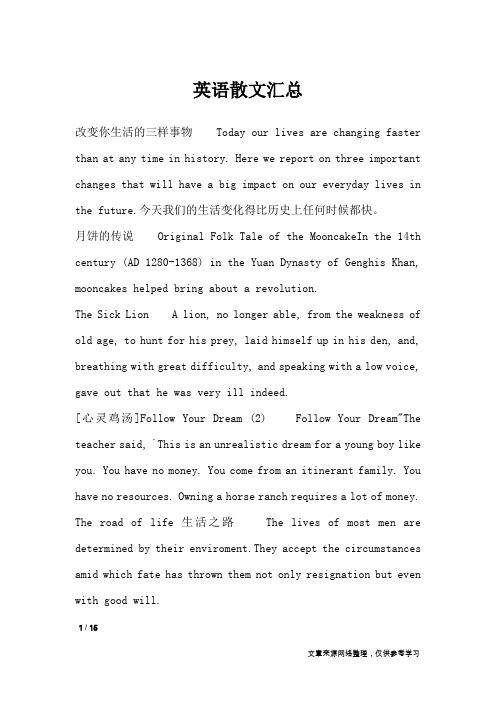
英语散文汇总改变你生活的三样事物 Today our lives are changing faster than at any time in history. Here we report on three important changes that will have a big impact on our everyday lives in the future.今天我们的生活变化得比历史上任何时候都快。
月饼的传说 Original Folk Tale of the MooncakeIn the 14th century (AD 1280-1368) in the Yuan Dynasty of Genghis Khan, mooncakes helped bring about a revolution.The Sick Lion A lion, no longer able, from the weakness of old age, to hunt for his prey, laid himself up in his den, and, breathing with great difficulty, and speaking with a low voice, gave out that he was very ill indeed.[心灵鸡汤]Follow Your Dream (2) Follow Your Dream"The teacher said, `This is an unrealistic dream for a young boy like you. You have no money. You come from an itinerant family. You have no resources. Owning a horse ranch requires a lot of money. The road of life 生活之路The lives of most men are determined by their enviroment.They accept the circumstances amid which fate has thrown them not only resignation but even with good will.1 / 15你今天心情不好吗?The Blue Day Book The Blue Day Book 布拉德里.特雷弗.格里夫著每个人都有忧郁的日子。
综合英语教程-第7册答案 unit 1 Neat People Vs sloppy
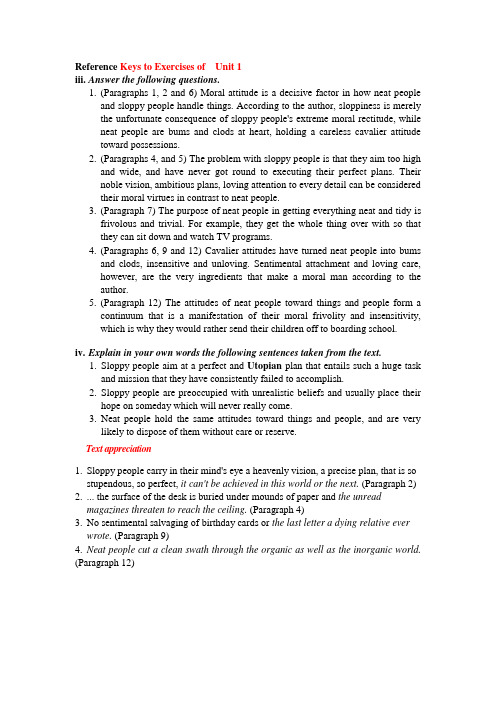
Reference Keys to Exercises of Unit 1iii.Answer the following questions.1.(Paragraphs 1, 2 and 6) Moral attitude is a decisive factor in how neat peopleand sloppy people handle things. According to the author, sloppiness is merely the unfortunate consequence of sloppy people's extreme moral rectitude, while neat people are bums and clods at heart, holding a careless cavalier attitude toward possessions.2.(Paragraphs 4, and 5) The problem with sloppy people is that they aim too highand wide, and have never got round to executing their perfect plans. Their noble vision, ambitious plans, loving attention to every detail can be considered their moral virtues in contrast to neat people.3.(Paragraph 7) The purpose of neat people in getting everything neat and tidy isfrivolous and trivial. For example, they get the whole thing over with so that they can sit down and watch TV programs.4.(Paragraphs 6, 9 and 12) Cavalier attitudes have turned neat people into bumsand clods, insensitive and unloving. Sentimental attachment and loving care, however, are the very ingredients that make a moral man according to the author.5.(Paragraph 12) The attitudes of neat people toward things and people form acontinuum that is a manifestation of their moral frivolity and insensitivity, which is why they would rather send their children off to boarding school.iv.Explain in your own words the following sentences taken from the text.1.Sloppy people aim at a perfect and Utopian plan that entails such a huge taskand mission that they have consistently failed to accomplish.2.Sloppy people are preoccupied with unrealistic beliefs and usually place theirhope on someday which will never really come.3.Neat people hold the same attitudes toward things and people, and are verylikely to dispose of them without care or reserve.Text appreciation1.Sloppy people carry in their mind's eye a heavenly vision, a precise plan, that is sostupendous, so perfect, it can't be achieved in this world or the next. (Paragraph 2) 2.... the surface of the desk is buried under mounds of paper and the unreadmagazines threaten to reach the ceiling. (Paragraph 4)3.No sentimental salvaging of birthday cards or the last letter a dying relative everwrote. (Paragraph 9)4.Neat people cut a clean swath through the organic as well as the inorganic world. (Paragraph 12)Language worki.Explain the italicized part in each sentence in your own words.1.absolute moral righteousness and correctness2.arrange in alphabetic order5. are gradually formed and developedzy and stupid5.finish quickly what they have to do6.destroy ruthlessly the main part ofI II.Fill in the blanks with the appropriate phrasal verbs or collocations from the text.1. passed on to2. toying with3. getting over4. straightened out5. part with6. figured out7. responded ... to8. gone through V.Fill in each blank in the passage below with ONE appropriate word.1. purposefully2. rather3. worthy4. who5. contributors6. developed7. staff8. stories9. described10. audience / readershipTranslationThe author holds that the fundamental difference between neat people and sloppy people is moral. The former place neatness above everything else and work on two unvarying principles: Never handle any item twice; and throw everything away. They are clear-minded and objective, but they are so indifferent that people, animals and things are all one to them. In sharp contrast, the latter fill their minds with all kinds of romantic whims and their ideals are just too perfect to come true in reality. What's more, the latter have a loving heart and seem to show sentimental attachments to everything. In a way, we may conclude that most statesmen and generals fall into the former category while most poets and artists belong to the latter type.Tips for Discussion1.With language, you might make the world laugh or weep when you laugh orweep.2.What Daniel Defoe, writer of Robinson Crusoe, experienced best illustrates thepower of the English language. It is said that his The True-born Englishman (1701) won him friendship; with the king while The Shortest Way with the Dissenters(1702) brought him into jail.3.So far as varieties of language are concerned, degrees of formality reflect to aconsiderate extent degrees of familiarity between people.4.Private language, though casual and less refined, often displays intimacy whilepublic language often betrays the distance between people.Composition Writing1.Based on your observations of friends or roommates and your own experiences,compare and contrast in a pa ragraph two people’s attitudes toward something.Focus on a single significant point of comparison. You might consider thefollowing as possible subjects:e of telephoneB.ClothesC.Shared vs. private spaceD.Shared vs. private objectsE.Loudness of conversations or musicF.Public behavior at a bus stop or some other places.2.As an objective observer, write an essay on cultural differences between two groups.You should have a central theme. Use specific examples to support your statements and try to avoid overgeneralization. And, of course, you should beware of making biased judgments.。
SJQU-QR-JW-033A0《高级英语》3课程教学大纲
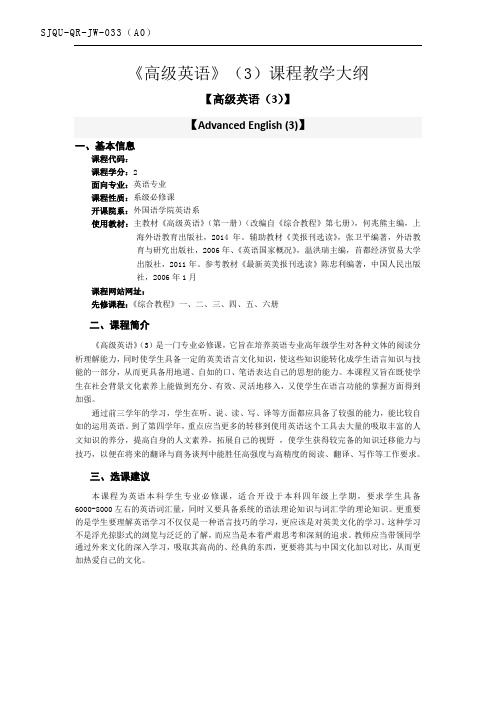
SJQU-QR-JW-033(A0)《高级英语》(3)课程教学大纲【高级英语(3)】【Advanced English (3)】一、基本信息课程代码:课程学分:2面向专业:英语专业课程性质:系级必修课开课院系:外国语学院英语系使用教材:主教材《高级英语》(第一册)(改编自《综合教程》第七册),何兆熊主编,上海外语教育出版社,2014年。
辅助教材《美报刊选读》,张卫平编著,外语教育与研究出版社,2006年、《英语国家概况》,温洪瑞主编,首都经济贸易大学出版社,2011年。
参考教材《最新英美报刊选读》陈忠利编著,中国人民出版社,2006年1月课程网站网址:先修课程:《综合教程》一、二、三、四、五、六册二、课程简介《高级英语》(3)是一门专业必修课,它旨在培养英语专业高年级学生对各种文体的阅读分析理解能力,同时使学生具备一定的英美语言文化知识,使这些知识能转化成学生语言知识与技能的一部分,从而更具备用地道、自如的口、笔语表达自己的思想的能力。
本课程又旨在既使学生在社会背景文化素养上能做到充分、有效、灵活地移入,又使学生在语言功能的掌握方面得到加强。
通过前三学年的学习,学生在听、说、读、写、译等方面都应具备了较强的能力,能比较自如的运用英语。
到了第四学年,重点应当更多的转移到使用英语这个工具去大量的吸取丰富的人文知识的养分,提高自身的人文素养,拓展自己的视野,使学生获得较完备的知识迁移能力与技巧,以便在将来的翻译与商务谈判中能胜任高强度与高精度的阅读、翻译、写作等工作要求。
三、选课建议本课程为英语本科学生专业必修课,适合开设于本科四年级上学期,要求学生具备6000-8000左右的英语词汇量,同时又要具备系统的语法理论知识与词汇学的理论知识。
更重要的是学生要理解英语学习不仅仅是一种语言技巧的学习,更应该是对英美文化的学习。
这种学习不是浮光掠影式的浏览与泛泛的了解,而应当是本着严肃思考和深刻的追求。
教师应当带领同学通过外来文化的深入学习,吸取其高尚的、经典的东西,更要将其与中国文化加以对比,从而更加热爱自己的文化。
U2研究生 新世纪英语教材上海外语 综合教程6 课件 unit 2 neat people VS s

Word Web A Quiz Background Information
Suzanne Britt James Mathew Barrie Never-Never Land La-Z-Boy Lead-in Discussion
6. Do you tuck a napkin into your shirt when
eating?
Word Web
7. Do you regularly wax your floors? 8. Do you organize your junk mail?
A Quiz
9. Do you own and use a spice rack?
Lead-in Discussion
Word Web A Quiz Background Information
Suzanne Britt James Mathew Barrie Never-Never Land La-Z-Boy
1. Born 150 years ago, J. M. Barrie spent most of his life in Switzerland. ( F )
Never-Never Land
recycle bin once you are done with it?
La-Z-Boy
4. Do you have a cleaning schedule?
Lead-in Discussion
5. Are you upset when something is out of place?
高级英语1何兆熊_unit1
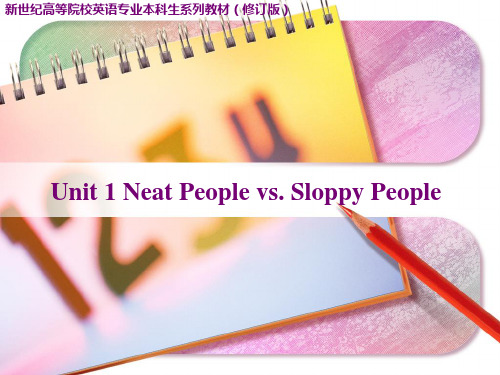
Section 2: Global Reading
Section 1: Warm Up
Lead-in
Topics for discussion
5. Does Suzanne Britt, author of the text we’re going to study, think in the same way?
Section 1: Warm Up
An effective beginning.
Making a comparison between a neat person and a sloppy person in a blunt and unexpected way, which succeeds in arousing the interest of the reader.
Section 1: Warm Up
Lead-in
Background Information
A prolific writer, Britt’s poems have appeared in quite a few literary magazines; her essays and articles have appeared in various newspapers and magazines, including Newsweek, The New York Times and The Boston Globe. Some of them have also been widely reprinted in college textbooks. Britt is author of several books, including Show and Tell (1982), and A Writer’s Rhetoric (1988). She also advises The Meredith Herald and The Colton Review.
- 1、下载文档前请自行甄别文档内容的完整性,平台不提供额外的编辑、内容补充、找答案等附加服务。
- 2、"仅部分预览"的文档,不可在线预览部分如存在完整性等问题,可反馈申请退款(可完整预览的文档不适用该条件!)。
- 3、如文档侵犯您的权益,请联系客服反馈,我们会尽快为您处理(人工客服工作时间:9:00-18:30)。
Unit 2 Neat People vs. Sloppy PeopleStructural AnalysisPart I(Paragraph 1) IntroductionIn Paragraph 1, the author introduces the topic of the text and presents her opinion that “neat people are lazier and meaner than sloppy people”.Part II(Paragraphs 2-5) Description of Sloppy PeopleParagraphs 2-5 focus on sloppy people who are portrayed as having a high moral standard and ambitious plans. Besides, they are also described as “giving loving attention to every detail”.Part III(Paragraphs 6-12) Description of Neat PeopleParagraphs 6-12 concentrate on the description of neat people. In these paragraphs, neat people are portrayed as cold-blooded, ruthless and very practical.Detailed ReadingDoes the article have an effective beginning? Why or why not? (Paragraph 1)Paragraph 1 proves itself a very effective beginning. Instead of drawing a conclusion at the end of the comparison, the author presents it at the beginning in a blunt and unexpected manner. The conclusion has completely overthrown the traditional opinions of the two types of people. Therefore, the beginning succeeds in arousing the reader’s interest.Why does the author repeat the word “someday” so many times? (Paragraph 3)The parallel sentences beginning with the same word “someday” can emphasize the truth that more justifications can hardly be found for the behavior of sloppy people in their present life except offering some beautiful hope that all such will be compensated for by their future plans.What rhetorical device does the auth or employ in such sentences as “They save everything, planning someday to file, order, and straighten out the world” and “…the unread magazines threaten to reach the ceiling?” (Paragraph 4)Hyperbole is used in these sentences to exaggerate the rigidness and impracticability of sloppy people in their life.What is the function of the sentence “A neat person would just bulldoze the desk” in terms of the text structure? (Paragraph 5)The sentence serves as a transition from the description of sloppy people to neat people in the following paragraphs.Why are neat people no good to borrow from? (Paragraph 11)Neat people buy anything in expensive little amount and throw away anything they’ve used. They don’t have anything left that people can borrow from them.What do neat people look like in others’ mind? What makes the author think that the difference between neat people and sloppy people is moral? (Paragraph 12)They are insensitive and cold-blooded. According to the author, a more humane relationship is reflected in the behavior of sloppy people. For neat people, the primary concern in their life is to establish a neat but cold and inhuman order even at the expense of the warm and friendly relationship between them and their belongings. Therefore, the author thinks the distinction between the two types of people is moral.sloppy: a. careless; untidye.g. a sloppy piece of work; sloppy workmanshiprectitude: n. honesty and moral uprightnesse.g. strive for rectitude and righteousnessin one’s mind’s eye: in one’s imagination or mental viewe.g. Each person as he comes upon the scene is described for us so that we may see him inour mind’s eye.stupendous: a. of astounding force, volume, degree, or excellence; marvelouse.g. a stupendous error/achievement; stupendous sums of moneystupendously ad.stupendousness n.Practice:métier: n. an occupation, a trade, or profession, work or activity for which a person is particularly suitede.g. This was assuredly not my métier. He’s found his métier at last.Synonym: callingalphabetize: v. arrange in alphabetic order1) The listings are arranged by state and are alphabetized by city.(=表中项目按州编排,以各个城名的字母顺序排列。
)2) Please alphabetize the documentation by the names of the authors in the bibliography.(=请将索引中的文献书目按作者的姓名字母顺序排列。
)scrapbook: n. a book with blank pages used for the mounting and preserving of pictures, clippings, or other mementoscorsage: n. a small bouquet of flowers worn by a woman at the shoulder or waist or on the wrist e.g. a corsage of orchids幻灯片39Section 3: Detailed Readingprom: n. a formal dance held for a high-school or college class typically at or near the end of the academic year幻灯片40Section 3: Detailed Readingstraighten: v. make or become straighte.g.He helped him straighten his tie.Collocation:straighten up: make one’s body straight or upright, especially after one has been bending or droopinge.g.He straightens up, combs his hair and walks into the meeting.幻灯片41Section 3: Detailed Readingstraighten out: make organized or tidye.g.It’ll take six weeks to get things straightened out.A legal contract does help to straighten out the mess when things go wrong.幻灯片42Section 3: Detailed Readingtake shape: assume a distinct form; develop into sth. definite or tangiblee.g.The past months have seen the state’s insurance legislation begin to take shape.幻灯片43Section 3: Detailed Readinghamper: n. a large basket, usually with a cover, used usually for carrying food in, or clothes to be washed (as in the context)e.g.We packed a big wicker hamper and went for a picnic.幻灯片44Section 3: Detailed Readingmemento (pl. mementoes or mementos): n. a reminder of the past; a keepsakee.g.the Presley napkin, a memento of the singer’s farewell concertone of the precious mementoes of his PresidencySynonym:souvenir, keepsake幻灯片45Section 3: Detailed Readingexcavation: n. sorting out things meticulouslyTransformation:excavate v. dig (When people excavate a piece of land they remove earth carefully from it and look for very old things such as pots, bones, or buildings which are buried there, in order to discover information of the past.)e.g.The project has excavated and partially restored the hilltop fort.幻灯片46Section 3: Detailed Readingmeticulously: ad. carefully and exactlye.g.The arrangements were planned meticulously.Synonym:precisely, fastidiously, painstakinglyTransformation:meticulous a. giving or showing great attention to detailse.g.a meticulous young manmeticulous observation of wild animalsHe had prepared himself with meticulous care.幻灯片47Section 3: Detailed Readingscrupulously: ad. carefully, conscientiouslye.g.The old church has been beautifully and scrupulously maintained. Synonym:precisely, fastidiously, painstakinglyTransformation:scrupulous a. careful, conscientiouse.g.The nurse told him to be scrupulous about keeping the wound clean.幻灯片48Section 3: Detailed Readingbulldoze: v. flatten with or as if with a bulldozere.g.bulldozed ruinsSettlements have been bulldozed out of the way.Synonym:flattenTransformation:bulldozer (=推土机)幻灯片49Section 3: Detailed Reading幻灯片50Section 3: Detailed Readingbum: n. (colloquial) a worthless or irresponsible persone.g.What an illiterate lot of bums you are!If he doesn’t leave his wife and kids provided for, he’s a bum.Synonym:lout幻灯片51Section 3: Detailed Readingclod: n. a foolish persone.g.What a clod he must think I am.Synonym:idiot幻灯片52Section 3: Detailed Readingat heart: in one’s real nature, in contrast to how one appearse.g.He is a good lad at heart.幻灯片53Section 3: Detailed Readingcavalier: a. showing arrogant or offhand disregard; dismissivee.g.He treated women in a cavalier fashion.Farmers were adopting a very cavalier attitude to what were very dangerous matters.幻灯片54Section 3: Detailed Reading heirloom: n. a valued possession passed down in a family through succeeding generations e.g.jewels and other family heirlooms幻灯片55Section 3: Detailed Readingtoy with: consider without being very seriouse.g.I’ve been toying with the idea for some time.Synonym:play with幻灯片56Section 3: Detailed Readingcut down on: reduce, restraine.g.She had cut down on smoking.幻灯片57Section 3: Detailed Readingclutter: n. a confused or disordered state or collection; a jumblee.g.The room was full of clutter.Brody eyed the clutter of pots and package.幻灯片58Section 3: Detailed Readingget over with: complete an unpleasant and tedious but necessary task promptlye.g.Come on, let’s get it over with.幻灯片59Section 3: Detailed Readingrasslin’: n. (also spelt as “rassling”) the professional wrestling which is a very popular sport as well as entertainment in the US幻灯片60Section 3: Detailed Reading幻灯片61Section 3: Detailed Readingsalvaging: n. action of saving from loss or destruction Transformation:salvage v.e.g.He did all he could to salvage something from the sinking ship.幻灯片62Section 3: Detailed Readingeconomics: n. Economics is the study of human choice behaviour. All of economics whether represented through articulation or empirically through mathematical means is essentially an analysis of the behaviour of human beings. In this context, the term refers to economic matters, especially financial considerations.Transformation:economy n.economic a.economical a.economically ad.economize v.幻灯片63Section 3: Detailed ReadingPractice:Fill in the blanks of the following sentences with the right words.1) What has gone wrong with the __________ system in the last ten years?2) How could the ___________ use of our time be organized?3) The big pitfall in Mitteran’s ___________ prove to be in internalization. economiceconomicaleconomics幻灯片64Section 3: Detailed Reading4) If yo u’re really going to buy a car, w e’ll have to____________ other things.5) England’s __________ is stilleconomizeeconomyeconomically幻灯片65Section 3: Detailed Readingden: n. a secluded room for relaxation or studye.g.the privacy of a furnished den in his basement幻灯片66Section 3: Detailed ReadingLa-Z-Boy recliner: n. a brand of recliner manufactured by La-Z-Boy Inc. In 1941, La-Z-Boy Inc. was incorporated in the state of Michigan and since then the La-Z-Boy has become the most recognized manufacturer in the world and North America’s largest manufacturer of upholstered furniture. Most Americans either own a La-Z-Boy recliner or know a friend or family member who does.幻灯片67Section 3: Detailed Reading幻灯片68Section 3: Detailed Readingwhip: v. stir quickly cream or egg white, until it is thick and frothy or fairly stiffe.g.fruit flan with whipped cream幻灯片69Section 3: Detailed Readingrinse: v. wash with clean water in order to remove unwanted substancee.g.rinse the leaves out of the tea potPractice:Translate the following sentences into Chinese.1) Gordon was washing the glasses in a bowl of soapy water and rinsing them at the sink. (=戈登先用肥皂水清洗杯子,然后放在洗碗槽里冲洗干净。
